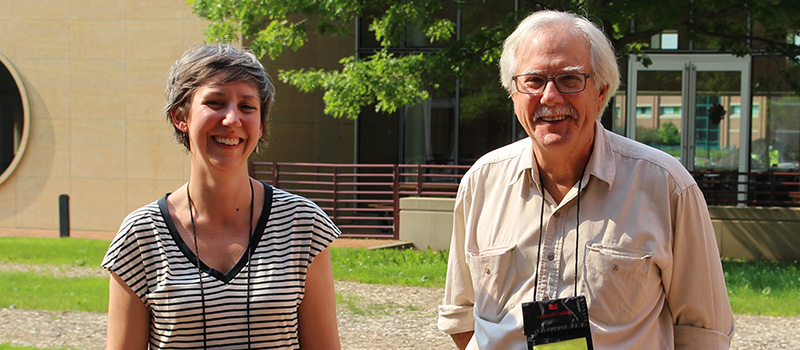Two alums follow divergent paths to become self-made translators
Aug. 14, 2019 — James Rudolph ’69 translates documents from Spanish to English in Peru even though he has never taken a Spanish language class. Maggie Montanaro ’05 is a French-to-English translator who studied French at Grinnell College and went to a translation graduate school in France.
While the two attended Grinnell in different eras and have taken different journeys to translating, a conversation during Reunion 2019 revealed they have more in common than anticipated. For instance, both agreed one of the biggest joys of the translating profession is that they are able to learn so much about unfamiliar subjects.
“I wouldn’t say I’m passionate about civil engineering, except that every topic when you delve into it becomes fascinating,” Montanaro says. “I get to learn about all the terminology and how things work. That keeps it interesting.”
 Self-employed translators Maggie Montanaro ’05, left, and James Rudolph ’69, met each other during Reunion 2019. Montanaro lives in France while Rudolph has spent the past 30 years residing in Peru.
Self-employed translators Maggie Montanaro ’05, left, and James Rudolph ’69, met each other during Reunion 2019. Montanaro lives in France while Rudolph has spent the past 30 years residing in Peru.
The origins of their translating interests come from writing, which was shaped by their days at Grinnell. Rudolph – who hadn’t been back to the campus in a half century prior to the class of 1969 celebrating its 50th reunion this year – still vividly recalls a Russian history class at Grinnell taught by Ezra Mendelssohn where students had to write essays.
“That class taught me an awful lot,” Rudolph says. “I thank professor Mendelssohn for helping me become a good writer. Translating is really about writing in English. You have to write well in English.”
After Grinnell, Rudolph was a VISTA (Volunteers in Service to America) volunteer in Oregon where he worked with an organization that helped settle migrant farm workers.
“I couldn’t understand a word being said at the meetings,” Rudolph says. “Through two years there I gradually caught on to some Spanish. Then I stuck my thumb out and ended up in Costa Rica. I spent six months there and my Spanish was pretty fair after that.”
His command of the language was further strengthened after Rudolph earned a master’s degree in Latin American studies at the University of New Mexico. He later edited books on Latin America and the Middle East. Rudolph originally traveled to Peru to write articles. The articles turned into a book, and Peru turned into his permanent home. He’s now been living there for 30 years.
Rudolph worked for United States Agency for International Development (USAID). Translating became a secondary occupation because he saw Peruvians struggling to write English and translate Spanish to English.
“When my work at USAID ended, I decided to start translating,” Rudolph says. “USAID and their contractors have to submit reports to government. I did development work for 15 years, so I knew the language and lingo.”
Rudolph has translated two books of a prominent Peruvian anthropologist, articles in bilingual magazines, websites of local banks, universities and travel agencies; academic books; and project reports from a wide variety of consulting firms and non-governmental organizations.
“I’ve had a tranquil life,” he says. “I have a big family that are wonderful people. When I went to Peru it was in a deep economic and political crisis. I’ve seen the country come out of that and establish a reasonably stable economy. It’s a fascinating country and there’s lots to learn.”
Montanaro lives in Nimes, France, and has over nine years professional experience in translating.
“What drew me to translation is I enjoyed writing,” Montanaro says. “I also enjoyed living in France and speaking French but I didn’t want to teach. Translation seemed like the best fit.”
Montanaro’s mother was a French teacher. Maggie accompanied her mom when she took students on school trips to France. Montanaro started taking French herself in middle school and liked it. While she didn’t come to Grinnell specifically to study French, she was enticed by the feel of the College, as well as its academic reputation.
Montanaro studied abroad in France and returned to the country to obtain a master’s degree in technical translation.
“Ironically, we never translated in class at the time,” she says about her U.S. courses. “We read novels in France, we wrote essays in French, learned grammar, and practiced conversations. In contrast, translations is a part of language learning from the beginning in France. I went into a translating program without ever experiencing translating.”
Like Rudolph, Montanaro started to network and gain clients, and those clients gave her name to other parties looking for a translator.
Montanaro does her fair share of technical translations in fields like civil, electrical, and mechanical engineering, and nuclear energy. She also volunteers with an organization that works with prostitutes and victims of human trafficking. She translate women’s stories who are seeking asylum. “That’s probably the most meaningful work I do.”
In addition, she does some creative translations, such as a dating app. “It can be goofy and fun,” she says. “You get to make up idiomatic phrases or creative solutions to translating cultural references. It’s a good break from the engineering translations.”
Rudolph and Montanaro enjoyed returning to Grinnell in late May to attend their respective class reunions. They were part of a handful of alums who traveled to Reunion from foreign countries.
“It was groovy to see my old buddies, and hear the variety of what they are doing with their lives and where they ended up living,” Rudolph says. “It also was wonderful to see Grinnell College doing so well.”
—by Jeremy Shapiro